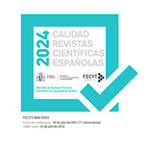Games and the Sacred in the Kingdom of Castille during the Late Middle Ages
Abstract
Playing is one of the most meaningful activities of our culture and, according to the philosopher Eugen Fink, one of the “fundamental phenomena of human existence”. The close connection between playing and the divine is one of its most important facets. At the start of the Middle Ages games were connected to pagan worship. For this reason, the Church condemned games, which led to the loss of their connection to sacredness. Despite this, people maintained their customs and love for games, which regained their popularity and social presence during the late Middle Ages. This circumstance forced authorities to regulate them like, for instance, king Alfonso X and the Libro del axedrez, dados e tablas. The Church’s condemnation, especially of gambling, was motivated by the alleged sinful consequences of games primarily, rather than their sinful nature, which explains the Church’s permissiveness when games were played both in the right context and company. For this reason, games maintained some of their essence and connection with the divine. This relationship is analyzed through legislative, literary and iconographic resources of the period.
Downloads
Article download
License
In order to support the global exchange of knowledge, the journal Eikon Imago is allowing unrestricted access to its content as from its publication in this electronic edition, and as such it is an open-access journal. The originals published in this journal are the property of the Complutense University of Madrid and any reproduction thereof in full or in part must cite the source. All content is distributed under a Creative Commons Attribution 4.0 use and distribution licence (CC BY 4.0). This circumstance must be expressly stated in these terms where necessary. You can view the summary and the complete legal text of the licence.











